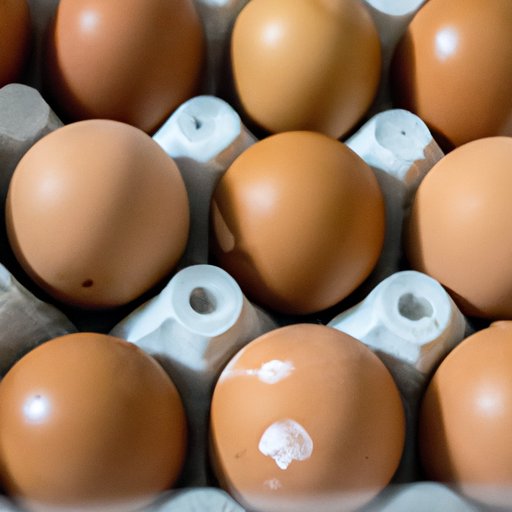
I. Introduction
Eggs are a staple in many households and are commonly used in a variety of dishes. But what happens when the expiration date on your egg carton has passed? Should you just throw the eggs away? It’s important to know the safety of consuming expired eggs to avoid any potential foodborne illnesses that could result from consuming spoiled eggs. This article explores the truth about expiration dates on eggs and provides tips on how to safely use expired eggs in cooking.
II. The Truth About Expiration Dates: Can You Safely Consume Expired Eggs?
Expiration dates are found on many food items and serve as a guideline for when the item is no longer safe to consume. However, when it comes to eggs, the expiration date can be a bit confusing. Eggs typically have a sell-by or use-by date rather than an expiration date. This date is determined by the government and is a way to regulate the quality and freshness of eggs.
The USDA’s Food Safety and Inspection Service recommends using eggs within three to five weeks of the date they were packed into the carton. It’s important to note that this date is not an expiration date, but rather a guideline for when the eggs will be at their freshest quality.
III. Don’t Throw Those Eggs Away Just Yet: The Science Behind Eating Expired Eggs
Egg shelf life and quality can vary depending on various factors such as storage temperature and humidity. Eggs that are properly stored in the refrigerator at 40 degrees Fahrenheit or below can usually be safely consumed up to four to five weeks after the sell-by date.
Eggs are also graded based on their quality, and the grading process takes into account factors such as the condition of the shell, size, and yolk quality. Grade AA eggs are considered the highest quality, with thick, firm whites and strong yolks. However, even lower-grade eggs can be safely consumed if they are stored properly and have not gone bad.
IV. Expired Eggs: Danger or Myth? What You Need to Know
Consuming expired eggs can pose a risk for foodborne illnesses such as salmonella or E.coli. These bacteria can cause symptoms such as diarrhea, fever, and abdominal cramps. However, not all expired eggs are automatically bad. It’s important to assess the freshness of the eggs before consuming them.
If an egg has gone bad, you may notice a foul smell or a change in the texture of the egg yolk or white. Discard any eggs that have a foul odor or look abnormal.
Proper egg handling and storage can also help reduce the risk of foodborne illnesses. Always wash your hands before and after handling raw eggs and store them in the refrigerator at 40 degrees Fahrenheit or below. Avoid using eggs that have cracked or broken shells, as they can be more susceptible to bacteria.
V. Reduce Food Waste and Save Money: Why Expired Eggs Might Still Be Edible
Reducing food waste is important not just for the environment, but for your wallet as well. If you have eggs that are approaching or have passed their sell-by date, it’s important to assess their freshness before throwing them away.
To assess the freshness of eggs, you can perform the water test. Simply fill a bowl with cold water and place the egg in the water. If it sinks to the bottom and lays flat on its side, it’s still fresh. If it stands upright or floats, it’s no longer fresh and should be discarded.
If your eggs pass the water test but are still past their sell-by date, you can use them in a variety of dishes such as quiches, frittatas, or omelets. Cooking eggs at high temperatures can help kill any bacteria that may be present.
VI. Expired Eggs: Tips for Safe Consumption and Delicious Recipes
When using expired eggs in cooking, it’s important to follow safe handling practices. Always wash your hands before and after handling raw eggs and avoid cross-contamination with other foods. Cook eggs to an internal temperature of 160 degrees Fahrenheit to ensure that any bacteria present is killed.
Here are a few delicious recipes that use eggs past their expiration date:
- Savory bread pudding
- Vegetable frittata
- Corn fritters
- Egg salad
Conclusion:
While it’s important to be cautious when consuming expired eggs, they can still be safely used in cooking if they pass the freshness test and are properly handled. By reducing food waste and getting creative in the kitchen, you can save money while still enjoying delicious meals.





